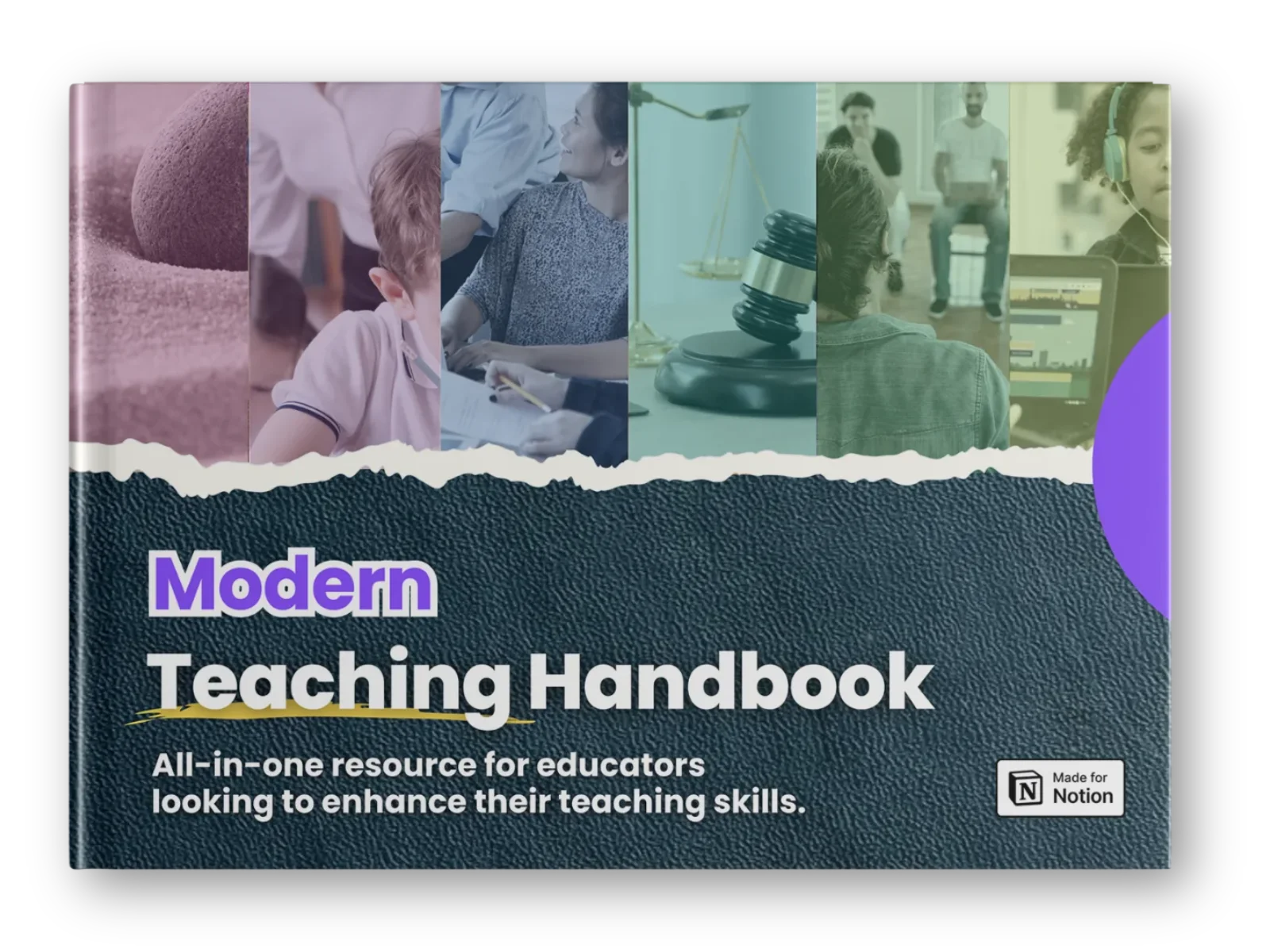Modern Teaching Handbook
Master modern education with the all-in-one resource for educators. Get your free copy now!



From Classroom to Career: The Lasting Benefits of a Master's Degree
From Classroom to Career: The Lasting Benefits of a Master's Degree
From Classroom to Career: The Lasting Benefits of a Master's Degree

Article by
Milo
ESL Content Coordinator & Educator
ESL Content Coordinator & Educator
All Posts
Pursuing a master's degree is a significant commitment, but it can be transformative for your career by equipping you with specialized knowledge and skills. This advanced education opens doors to opportunities unavailable to those with only an undergraduate degree, offering potential for increased earnings, personal development, and network expansion. Learning from experts and collaborating with peers can lead to valuable professional connections that help advance your career. In a competitive job market, a master's degree provides the extra edge, positioning you as a strong candidate for leadership roles and making career progression more attainable.
Pursuing a master's degree is a significant commitment, but it can be transformative for your career by equipping you with specialized knowledge and skills. This advanced education opens doors to opportunities unavailable to those with only an undergraduate degree, offering potential for increased earnings, personal development, and network expansion. Learning from experts and collaborating with peers can lead to valuable professional connections that help advance your career. In a competitive job market, a master's degree provides the extra edge, positioning you as a strong candidate for leadership roles and making career progression more attainable.
Modern Teaching Handbook
Master modern education with the all-in-one resource for educators. Get your free copy now!

Modern Teaching Handbook
Master modern education with the all-in-one resource for educators. Get your free copy now!

Modern Teaching Handbook
Master modern education with the all-in-one resource for educators. Get your free copy now!

The Journey Through a Master's Program
Embarking on a master's program provides a transformative experience with critical decisions, dynamic learning spaces, and the cultivation of advanced capabilities. Each stage shapes your path toward expertise and professional growth.
Selecting the Right Program
Choosing the right master's program is crucial. It's essential to consider factors that align with your career goals and personal interests. For those pursuing careers in the hospitality industry, a master in hotel management offers targeted expertise and skill development tailored to this sector. Reflect on the program's curriculum, faculty expertise, and industry connections.
Accreditation and reputation often signal quality education and valuable networking opportunities. Reach out to alumni and professionals to gain insights into potential career pathways. Comparing different programs side-by-side helps in making an informed decision.
Immersive Learning Experiences
Master's programs emphasize interactive and immersive learning experiences. You participate in practical projects that mirror real-world challenges and scenarios. Internships and research collaborations expand your perspective.
Engagement with industry professionals and experts through seminars and workshops enriches your educational journey. These activities provide a platform to apply theoretical knowledge and gain practical insights. You also develop critical thinking skills by tackling complex issues.
Developing Advanced Skills
A master's degree cultivates advanced skills indispensable for career advancement. Analytical and problem-solving abilities are honed through rigorous coursework and projects. Communication skills are enhanced through presentations and collaborative efforts.
Leadership is fostered through group projects and roles in various initiatives. For those pursuing specific fields, such as hotel management, specialized skills prepare you for sector-specific challenges. Staying current with industry trends ensures that your skills are relevant and in demand.
Career Advancement with a Master's Degree
Earning a master's degree opens doors to increased employment opportunities, higher earning potential, and leadership roles. You gain specialized knowledge that enhances your career prospects and supports your professional growth.
Increased Employment Opportunities
With a master's degree, you can access more diverse job opportunities due to the advanced skills and specialized knowledge it provides. Many industries value this higher level of education, giving you an edge in competitive fields.
Potential employers often view candidates with a master's as more competent and dedicated. This can be crucial in fields such as academia, healthcare, and engineering, where specialized expertise is highly valued. You'll also find that certain roles specifically require a master's degree, making you eligible for positions that others may not qualify for.
Higher Earning Potential
A master's degree often leads to higher wages compared to a bachelor's degree. Statistics consistently indicate that professionals with advanced degrees earn significantly more over the course of their careers. This financial advantage can provide long-term economic stability and increased savings potential.
Greater earning capacity enables more significant investments in personal and family life. It also offers the flexibility to explore career paths that align more closely with personal passions. This pursuit of specialized roles may lead to further financial advantages and job satisfaction.
Leadership and Management Roles
A master's degree often sets you apart as a candidate for leadership and management positions. These roles often demand advanced proficiency and the ability to manage complex projects and teams effectively. Your studies likely included courses focused on leadership, providing you with essential skills for upper-level positions.
Moreover, many organizations look for individuals who can drive innovation and improvement within their teams. Having a master's degree signifies a dedication to growth and development, characteristics attractive to employers seeking future leaders.
These opportunities for advancement into managerial roles can elevate your professional journey, enabling impactful contributions to your field. More importantly, they allow you to inspire and guide others, fostering an environment of collaboration and success.
Long-Term Professional Impact
Pursuing a master's degree can significantly shape your professional journey. You'll gain elevated expertise and credibility, expand your network, and enjoy continuous learning and growth.
Expertise and Credibility
Holding a master's degree enhances your expertise, positioning you as a knowledgeable authority in your field. This academic achievement provides you with advanced skills and in-depth knowledge, setting you apart in competitive job markets.
Employers often value candidates who have specialized knowledge. A master's degree can show your dedication and ability to tackle complex challenges. As a result, you might find career advancement opportunities more accessible. With increased expertise, you become more adaptable, ready to tackle new responsibilities, and lead innovative projects with confidence.
Networking and Professional Relationships
A master's program offers valuable opportunities to expand your professional network. You connect with peers from diverse backgrounds and industries, fostering relationships that could lead to collaborations and job opportunities.
Professors and industry professionals provide insights and mentorship. Engaging with guest speakers and networking events further broadens your connections. These relationships not only enrich your academic experience but also open doors in the professional world. Such networks offer support, guidance, and potential partnerships that can be pivotal for career advancement.
Lifelong Learning and Growth
A master's degree instills a passion for learning that lasts throughout your career. This pursuit nurtures critical thinking and problem-solving abilities, enabling you to adapt to changes and seize opportunities.
With continuous professional development, you stay on top of industry trends and skills. The motivation to learn extends beyond formal education, encouraging you to participate in workshops, conferences, and certifications. This commitment to growth can result in personal and professional fulfillment, as well as keeping your career trajectory moving forward.
Final Thoughts
Pursuing a master's degree offers numerous lasting benefits, from specialized knowledge and increased earning potential to enhanced leadership opportunities and personal growth. This advanced education not only opens doors to diverse career paths but also fosters valuable professional relationships and a lifelong passion for learning. Whether you're seeking to advance in your current field or explore new possibilities, a master's degree provides the expertise, credibility, and network needed to thrive in an increasingly competitive job market. Ultimately, it equips you with the tools to continuously grow, adapt, and succeed throughout your career.
The Journey Through a Master's Program
Embarking on a master's program provides a transformative experience with critical decisions, dynamic learning spaces, and the cultivation of advanced capabilities. Each stage shapes your path toward expertise and professional growth.
Selecting the Right Program
Choosing the right master's program is crucial. It's essential to consider factors that align with your career goals and personal interests. For those pursuing careers in the hospitality industry, a master in hotel management offers targeted expertise and skill development tailored to this sector. Reflect on the program's curriculum, faculty expertise, and industry connections.
Accreditation and reputation often signal quality education and valuable networking opportunities. Reach out to alumni and professionals to gain insights into potential career pathways. Comparing different programs side-by-side helps in making an informed decision.
Immersive Learning Experiences
Master's programs emphasize interactive and immersive learning experiences. You participate in practical projects that mirror real-world challenges and scenarios. Internships and research collaborations expand your perspective.
Engagement with industry professionals and experts through seminars and workshops enriches your educational journey. These activities provide a platform to apply theoretical knowledge and gain practical insights. You also develop critical thinking skills by tackling complex issues.
Developing Advanced Skills
A master's degree cultivates advanced skills indispensable for career advancement. Analytical and problem-solving abilities are honed through rigorous coursework and projects. Communication skills are enhanced through presentations and collaborative efforts.
Leadership is fostered through group projects and roles in various initiatives. For those pursuing specific fields, such as hotel management, specialized skills prepare you for sector-specific challenges. Staying current with industry trends ensures that your skills are relevant and in demand.
Career Advancement with a Master's Degree
Earning a master's degree opens doors to increased employment opportunities, higher earning potential, and leadership roles. You gain specialized knowledge that enhances your career prospects and supports your professional growth.
Increased Employment Opportunities
With a master's degree, you can access more diverse job opportunities due to the advanced skills and specialized knowledge it provides. Many industries value this higher level of education, giving you an edge in competitive fields.
Potential employers often view candidates with a master's as more competent and dedicated. This can be crucial in fields such as academia, healthcare, and engineering, where specialized expertise is highly valued. You'll also find that certain roles specifically require a master's degree, making you eligible for positions that others may not qualify for.
Higher Earning Potential
A master's degree often leads to higher wages compared to a bachelor's degree. Statistics consistently indicate that professionals with advanced degrees earn significantly more over the course of their careers. This financial advantage can provide long-term economic stability and increased savings potential.
Greater earning capacity enables more significant investments in personal and family life. It also offers the flexibility to explore career paths that align more closely with personal passions. This pursuit of specialized roles may lead to further financial advantages and job satisfaction.
Leadership and Management Roles
A master's degree often sets you apart as a candidate for leadership and management positions. These roles often demand advanced proficiency and the ability to manage complex projects and teams effectively. Your studies likely included courses focused on leadership, providing you with essential skills for upper-level positions.
Moreover, many organizations look for individuals who can drive innovation and improvement within their teams. Having a master's degree signifies a dedication to growth and development, characteristics attractive to employers seeking future leaders.
These opportunities for advancement into managerial roles can elevate your professional journey, enabling impactful contributions to your field. More importantly, they allow you to inspire and guide others, fostering an environment of collaboration and success.
Long-Term Professional Impact
Pursuing a master's degree can significantly shape your professional journey. You'll gain elevated expertise and credibility, expand your network, and enjoy continuous learning and growth.
Expertise and Credibility
Holding a master's degree enhances your expertise, positioning you as a knowledgeable authority in your field. This academic achievement provides you with advanced skills and in-depth knowledge, setting you apart in competitive job markets.
Employers often value candidates who have specialized knowledge. A master's degree can show your dedication and ability to tackle complex challenges. As a result, you might find career advancement opportunities more accessible. With increased expertise, you become more adaptable, ready to tackle new responsibilities, and lead innovative projects with confidence.
Networking and Professional Relationships
A master's program offers valuable opportunities to expand your professional network. You connect with peers from diverse backgrounds and industries, fostering relationships that could lead to collaborations and job opportunities.
Professors and industry professionals provide insights and mentorship. Engaging with guest speakers and networking events further broadens your connections. These relationships not only enrich your academic experience but also open doors in the professional world. Such networks offer support, guidance, and potential partnerships that can be pivotal for career advancement.
Lifelong Learning and Growth
A master's degree instills a passion for learning that lasts throughout your career. This pursuit nurtures critical thinking and problem-solving abilities, enabling you to adapt to changes and seize opportunities.
With continuous professional development, you stay on top of industry trends and skills. The motivation to learn extends beyond formal education, encouraging you to participate in workshops, conferences, and certifications. This commitment to growth can result in personal and professional fulfillment, as well as keeping your career trajectory moving forward.
Final Thoughts
Pursuing a master's degree offers numerous lasting benefits, from specialized knowledge and increased earning potential to enhanced leadership opportunities and personal growth. This advanced education not only opens doors to diverse career paths but also fosters valuable professional relationships and a lifelong passion for learning. Whether you're seeking to advance in your current field or explore new possibilities, a master's degree provides the expertise, credibility, and network needed to thrive in an increasingly competitive job market. Ultimately, it equips you with the tools to continuously grow, adapt, and succeed throughout your career.
Modern Teaching Handbook
Master modern education with the all-in-one resource for educators. Get your free copy now!

Modern Teaching Handbook
Master modern education with the all-in-one resource for educators. Get your free copy now!

Modern Teaching Handbook
Master modern education with the all-in-one resource for educators. Get your free copy now!

Table of Contents
Modern Teaching Handbook
Master modern education with the all-in-one resource for educators. Get your free copy now!
2024 Notion4Teachers. All Rights Reserved.
2024 Notion4Teachers. All Rights Reserved.
2024 Notion4Teachers. All Rights Reserved.
2024 Notion4Teachers. All Rights Reserved.







